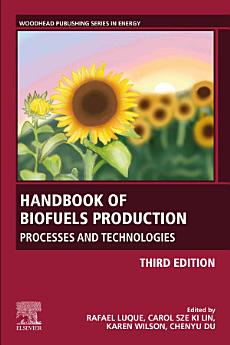Handbook of Biofuels Production: Processes and Technologies, Edition 3
About this ebook
About the author
Rafael Luque (PhD 2005, Universidad de Cordoba, Spain) has significant experience in biomass and waste valorization practices to materials, fuels, and chemicals as well as nanoscale chemistry, green chemistry and (photo)catalysis (600+ publications, h-index 92, >39,000 citations, 7 patents, 10 edited books). He is Editor-in-chief of Molecular Catalysis (Elsevier) and has been named 2018, 2019, 2020, 2021 and 2022 Highly Cited Researcher (Clarivate Analytics).
Dr. Carol Sze Ki Lin is currently a Professor at the School of Energy and Environment at City University of Hong Kong (CityUHK). Her research interests lie in technological advancement and development of circular waste-based biorefinery for sustainable production of chemicals, materials and fuels, that contributes to reduction of environmental burden of waste disposal and enhancement of resource efficiency. She has been involved in over 30 research projects as Principal Investigator, which mainly focus on development of integrated biorefinery strategies includes valorization of agricultural residues, food, beverage, plastic and textile wastes. She has been a Fellow of the Royal Society of Chemistry (FRSC) since July 2024.
Karen Wilson is Professor of Catalysis in the School of Science at RMIT University and was previously Chair of Catalysis and Research Director of the European Bioenergy Research Institute at Aston University (2013-17), where she also held a Royal Society Industry Fellowship in collaboration with Johnson Matthey. She holds a BA and PhD from the University of Cambridge, and MSc in heterogeneous catalysis from the University of Liverpool and has held academic positions at the University of York and Cardiff University. Her research interests lie in the design of tunable porous materials for sustainable biofuels and chemicals production from renewable resources. She is currently Associate Editor of the academic journals Sustainable Energy & Fuels, and Energy & Environmental Materials.
Chenyu Du is a Reader in Chemical Engineering in the School of Applied Sciences at the University of Huddersfield. His BEng was awarded in Chemical Engineering from Tsinghua University, China. He completed his PhD in the department of Chemical Engineering in Tsinghua University. He held a Postdoctoral Research Associate position at the University of Manchester working on a platform chemical production from sustainable raw materials. Following this he joined a research and development company in London contributing to the development of the 2nd generation of biofuel. In 2010 he was appointed as lecturer in the University of Nottingham. He has been involved in research pertaining to the Lignocellosic Conversion to Ethanol programme. He was responsible for developing and directing a new MSc course on Sustainable Bioenergy. His research interests focus on bioenergy, fermentation, metabolic engineering, bioprocess development and simulation. He has generated research income over £17 million as PI or Co-I.








